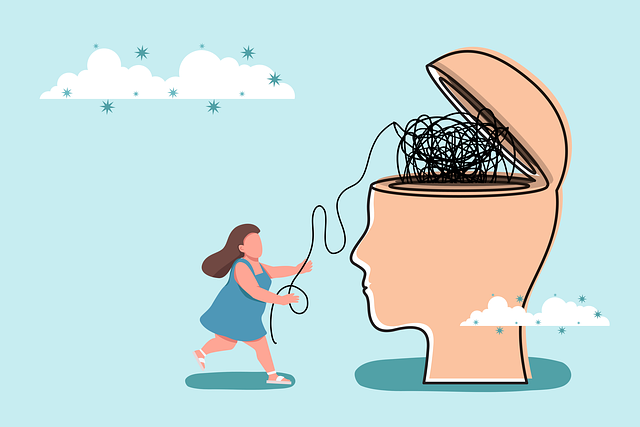Adult alcohol abuse significantly impacts mental wellness, with alcohol's effects ranging from immediate to long-term psychological consequences, often leading or exacerbating disorders like anxiety, depression, and psychosis. Effective therapy tailored to adults with alcohol abuse problems addresses underlying causes, teaches coping skills, and enhances social support through programs such as Social Skills Training and Coping Skills Development. Digital age technology offers accessible tools for healing via online platforms and mobile apps, destigmatizing addiction and encouraging help-seeking. Designing an effective therapy app involves evidence-based practices like CBT, mindfulness exercises, and motivational interviewing, including interactive sessions, personalized feedback, progress tracking, mental health education, support group forums, and self-care routines tailored to individual needs. Prioritizing user privacy, safety, and ethical practices is crucial in developing such apps. Community outreach programs enhance accessibility and trust, connecting those in need with essential resources and support systems for therapy for adults alcohol abuse.
In today’s digital age, technology plays a pivotal role in enhancing mental wellness. This article explores how Therapy for Adults Alcohol Abuse apps can revolutionize recovery journeys. We delve into understanding the profound impact of adult alcohol abuse on mental health and its complex relationship with addiction. Subsequently, we examine the potential of digital technology to support recovery, focusing on designing effective features tailored to this specific need. Furthermore, ethical considerations and privacy safeguards are discussed to ensure responsible wellness app development.
- Understanding Adult Alcohol Abuse and Its Impact on Mental Health
- The Role of Digital Technology in Supporting Addiction Recovery
- Designing Effective Features for a Therapy App Focused on Alcohol Abuse
- Ensuring Privacy, Safety, and Ethical Considerations in Wellness App Development
Understanding Adult Alcohol Abuse and Its Impact on Mental Health

Adult alcohol abuse is a significant public health concern that demands our attention, especially regarding its impact on mental wellness. Alcohol has both short-term and long-lasting effects on an individual’s psychology, often leading to more complex mental health issues when left unaddressed. The relationship between alcohol abuse and mental health disorders is intricate; one may exacerbate the other, creating a cycle of dependence and distress. Many individuals struggling with alcohol addiction experience anxiety, depression, or even psychosis, highlighting the urgent need for comprehensive therapy services tailored to adults with alcohol abuse problems.
Therapy for adults with alcohol abuse issues focuses on various aspects of care, including identifying and addressing underlying causes, teaching coping skills, and enhancing social support networks. Social Skills Training and Coping Skills Development are essential components of these therapeutic interventions. By raising public awareness through campaigns that destigmatize mental health and addiction, we can encourage more people to seek help early. Such initiatives play a pivotal role in fostering a supportive environment where individuals feel empowered to embrace recovery and improve their overall mental wellness.
The Role of Digital Technology in Supporting Addiction Recovery

In today’s digital era, technology plays a pivotal role in supporting addiction recovery, especially for adults struggling with alcohol abuse. Online platforms and mobile apps are revolutionizing therapy by offering accessible and convenient tools to aid in the healing process. Apps designed for this purpose provide a wide range of features, such as personalized programs, virtual support groups, and digital tracking tools that help users monitor their progress and stay accountable.
One notable aspect is the integration of stress reduction methods and confidence-boosting activities within these apps. By incorporating mindfulness exercises, meditation techniques, and cognitive behavioral therapy (CBT) strategies, users can learn effective coping mechanisms to manage cravings and triggers. Additionally, public awareness campaigns development fueled by digital technology has played a significant role in destigmatizing addiction, encouraging individuals to seek help, and promoting resources for those in need of therapy for adults alcohol abuse.
Designing Effective Features for a Therapy App Focused on Alcohol Abuse

Designing effective features for a therapy app focused on alcohol abuse requires a multifaceted approach that caters to the unique needs of adults seeking recovery. Incorporate evidence-based practices such as cognitive behavioral therapy (CBT), mindfulness exercises, and motivational interviewing techniques to empower users in their journey towards sobriety. These therapeutic tools can be integrated through interactive sessions, personalized feedback mechanisms, and progress tracking features, enabling individuals to develop healthier coping strategies and maintain long-term abstinence.
Moreover, mental health awareness and education play a pivotal role in app design. Include resources like informative articles, video testimonials, and support group forums to foster a sense of community and understanding. Encourage users to engage in self-care routines tailored to their specific needs, promoting better mental health overall. Regular check-ins, mood tracking, and seamless access to professional help should be integral components, ensuring that users feel supported throughout their recovery process.
Ensuring Privacy, Safety, and Ethical Considerations in Wellness App Development

In the realm of mental wellness app development, prioritizing privacy, safety, and ethical considerations is paramount. As users share intimate details about their emotional well-being, developers must ensure robust data protection measures are in place. This includes employing end-to-end encryption, secure storage protocols, and transparent data sharing policies to safeguard sensitive information from unauthorized access or breaches. Moreover, integrating features that promote safe communication channels, such as anonymous reporting options and digital safety tools, can empower users seeking therapy for adults with alcohol abuse issues or other mental health concerns.
Ethical considerations extend beyond privacy. Developers must also address potential biases in algorithms, ensure user consent at every step, and implement conflict resolution techniques within the app to handle sensitive discussions. Risk management planning for mental health professionals is crucial to establishing guidelines for handling crises and ensuring a safe environment for both users and practitioners. Additionally, community outreach program implementation can foster trust and accessibility, connecting individuals in need with valuable resources and support systems.
The development of mental wellness apps, particularly those focused on therapy for adults with alcohol abuse issues, presents a promising avenue for supporting recovery. By leveraging digital technology, these apps can provide accessible and personalized care, filling crucial gaps in traditional treatment methods. However, as we navigate this exciting landscape, it’s imperative to prioritize user privacy, safety, and ethical considerations to ensure these tools enhance rather than compromise mental health outcomes. With thoughtful design and a commitment to evidence-based practices, wellness apps have the potential to revolutionize addiction recovery, offering hope and support to those in need.














